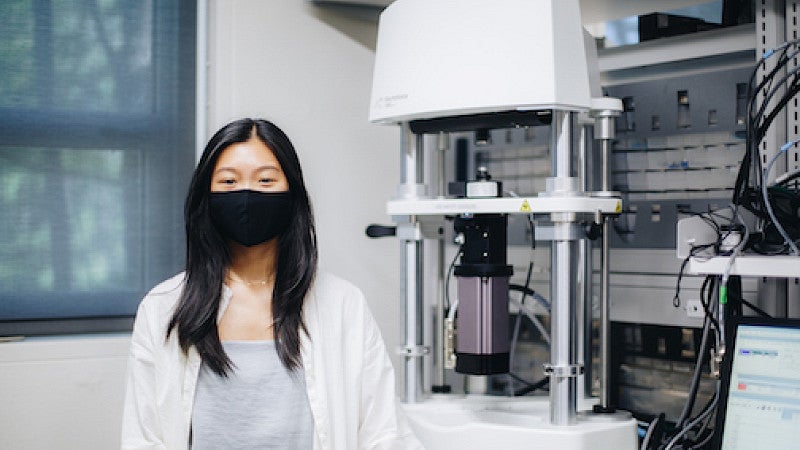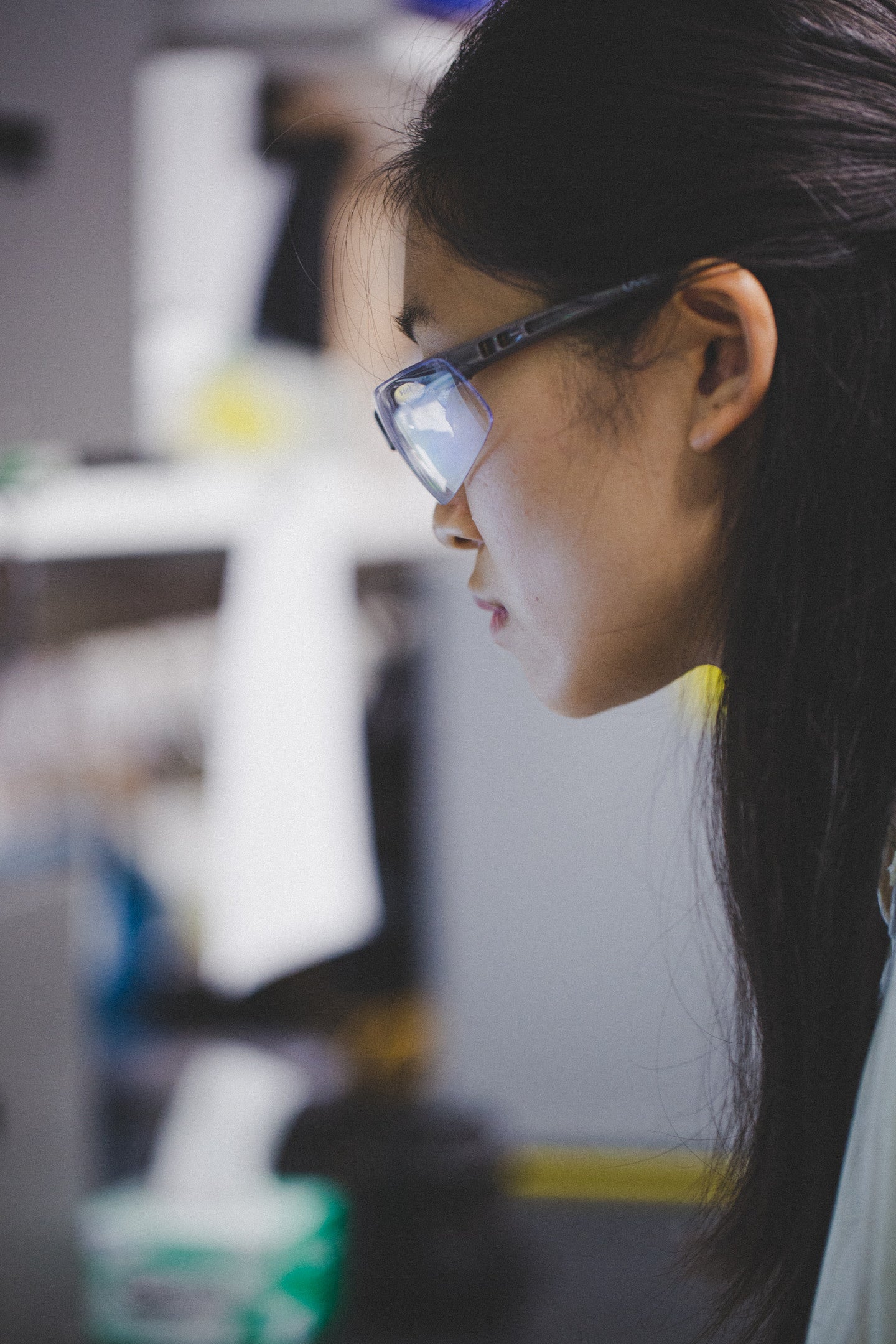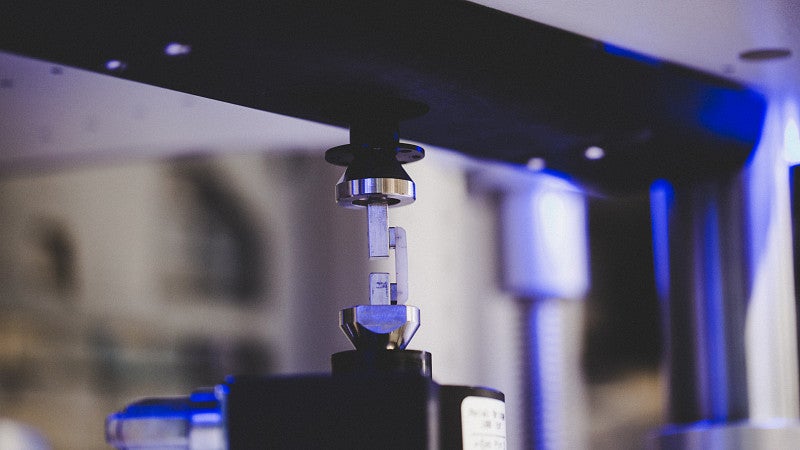Exploring Healing in Personalized Medicine
by Laurie Galbraith, CHC Communications
photos by Sarah Northrop, CHC Communications
Biomechanics thrill Karly Fear. Working with medical technology that can be personalized and fit to people’s specific fracture or trauma situations is what she considers the most fascinating work anyone can do.
“I’ve always been interested in medicine and its applications — like technology. And, once I got into this research, I learned that there are so many ways to approach these types of issues,” says Fear.
Long before attending the University of Oregon, Fear, a rising Clark Honors College senior, was taken with medicine, therapies and devices tailored to individual patients. She says that curiosity is now a full-blown passion that she gets to channel into research.
“For the longest time, I’ve loved science and knew that I wanted to be close to medicine. Actually living that out has been so exciting,” says Fear.
Fear is one of two CHC students in the second Knight Campus Undergraduate Scholars program cohort. The research-centered program, which has nine students this year, awards $8,000 to natural science majors with a minimum 3.3 GPA. It provides interdisciplinary collaboration, mentoring and networking opportunities, and the structure is one of Fear's favorite components of the program.
“One of the best parts [of KCUS] is the cohort,” she says. “We meet once a week with the program manager and discuss things like how the lab is structured and how to read scientific articles. It’s cool to see other people’s experiences and what they’re doing.”

The KCUS program and CHC both place a premium on diverse collaboration and networking opportunities — on and off campus. Fear points to a “Science Knight Out” event that ultimately swayed her decision to choose the University of Oregon and ultimately apply to the prestigious scholarship program.
The partnership between the Knight Campus and CHC is really symbiotic, says Robert Guldberg, vice president and Robert and Leona DeArmond Executive Director of the Knight Campus.
"Students will benefit from the tremendous access, experience and opportunity. But the Knight Campus — and ultimately society — also will benefit from the tremendously talented honors college students who take part in the program,” he adds.
“Before making my decision, I attended a lecture given by Dr. Robert Guldberg. He mentioned a goal of the program was to attract students who were drawn to UO’s kind of research that Knight Campus would be doing,” says Fear.

Fear’s research centers around broken bones, which are a significant problem for many people. Bones do heal naturally on their own, but certain factors can hinder or block healing. According to Fear’s KCUS mentor, Salil Karipott, in the Ong Lab of Knight Campus professor Keat Ghee Ong, research has found that small magnitude loads — impact on the bone during daily activities like walking or running — can assist with healing. Small magnitude loads are 100 times smaller than the ones seen during daily activity, these are called Low Magnitude High Frequency loads.
“Our project is developing a device that can generate such small magnitude loads with magnetically active materials. This device can generate localized low-magnitude loads by applying magnetic fields without any need for wires or electronic components inside the body — this technology could very well be used in humans soon where people can heal bone fractures with this technology at home with a daily therapy of a few minutes,” says Karipott.
Fear has always had a strong interest in medicine and technology but says it was the program’s focus on interdisciplinary collaboration helped her both expand her vision and streamline her goals. She started learning that there were different ways to approach her research, such as using orthopedics.
It makes sense that Fear enjoys the cohort structure of the KCUS program; part of her decision to come to the UO was the small group feel within CHC.

Fear says she chose CHC for the “immediacy of connection.” With only 19 students in class her first term and office hours that weren’t intimidating, she felt immediately comfortable.
Clark Honors College Assistant Dean of Advising & Strategic Partnerships, Elizabeth Raisanen, reinforces Fear’s experience.
“One of the great features of the CHC's partnership with the Knight Campus Undergraduate Scholars Program is that it fosters close connections between students and their Knight Campus research mentors, and with their honors college advisors,” she says. “I got to know Karly incredibly well as she prepared her application materials for the program, and I was impressed with her focus and her motivation to join a lab so early in her college career.”
In addition to a closely connected learning environment and interdisciplinary focus, Fear says she values deeply that she’s learning how to think about science and communicate the concepts to a broader audience. And, while it may sound surprising, she’s seeing that being willing to learn is just as important as finding answers.
“The point is not expertise. The point is to challenge and explore,” says Fear.
Karipott agrees.
“I think our goal was to treat this as a learning experience rather than just replicating tests from protocols. Karly asks a lot of questions which, in my opinion, is the best way to learn,” says Karipott. “This project has encouraged her to explore new skills outside research like CAD and 3D printing.”
Fear has big goals for the future. She hopes to finish her undergraduate degree in a three-year timetable, then pursue genomics and bioinformatics. A researcher at heart, she says graduate school is definitely the next step.
“I am confident that I will continue to pursue research in my future and return to the academic community at some point in my career, hopefully giving others the opportunities that have propelled me forward.”
As she navigates plans for her future, Fear spends downtime baking chocolate chip cookies and Baked Alaska (her specialty) and coloring — all outlets she finds satisfying because of the creativity involved.
One more thing she’s learned in her downtime: A global pandemic can provide unforeseen opportunities for reflection and new realizations.
“I’m seeing how important conversations are, especially during quarantine.”
